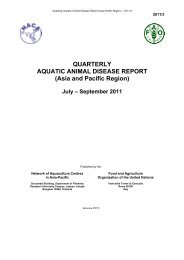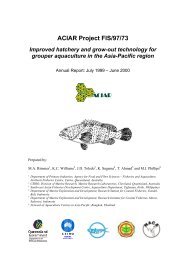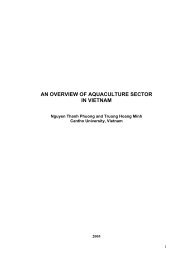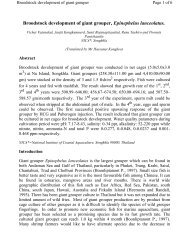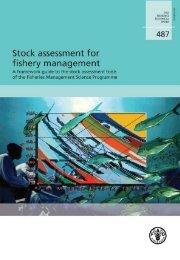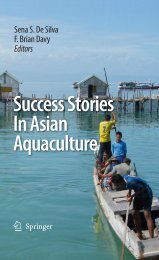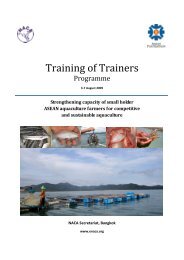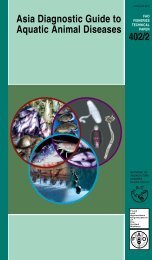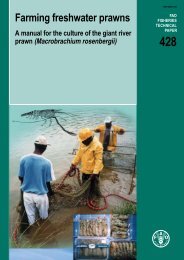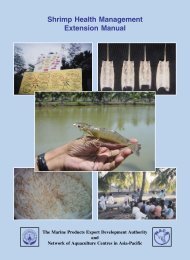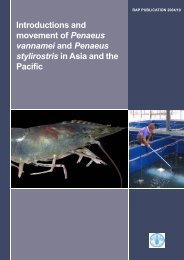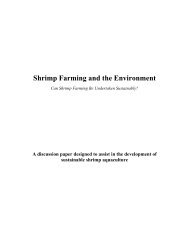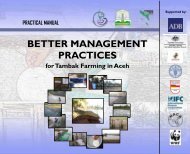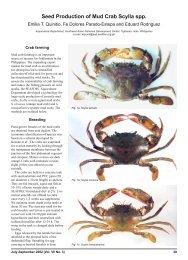State of World Fisheries and Aquaculture 2004 - Library
State of World Fisheries and Aquaculture 2004 - Library
State of World Fisheries and Aquaculture 2004 - Library
You also want an ePaper? Increase the reach of your titles
YUMPU automatically turns print PDFs into web optimized ePapers that Google loves.
40<br />
The <strong>State</strong> <strong>of</strong> <strong>World</strong> <strong>Fisheries</strong> <strong>and</strong> <strong>Aquaculture</strong> <strong>2004</strong><br />
Box 3<br />
Mainstreaming fisheries into national development<br />
<strong>and</strong> poverty reduction strategies<br />
The fisheries sector plays an important role in the alleviation <strong>of</strong><br />
poverty <strong>and</strong> the achievement <strong>of</strong> food security in many parts <strong>of</strong> the<br />
world. <strong>Fisheries</strong> exports now generate more foreign exchange (either<br />
through export earnings or licence receipts) than the revenues earned<br />
from any other traded food commodity such as rice, cocoa, c<strong>of</strong>fee or<br />
tea. <strong>World</strong>wide, more than 38 million people are directly engaged<br />
in fishing <strong>and</strong> fish farming as a full-time or, more frequently, parttime<br />
occupation, <strong>and</strong> fishery products account for 15–16 percent <strong>of</strong><br />
global animal protein intake. Seventy percent <strong>of</strong> the fish for human<br />
consumption is presently supplied by developing countries. The<br />
fisheries sector is particularly important for 44 countries (15 small isl<strong>and</strong><br />
developing states [SIDS], 12 African <strong>and</strong> 12 Asian countries, 3 transition<br />
economies <strong>and</strong> 2 Latin American countries) where the sector makes<br />
a significant contribution to both exports <strong>and</strong> domestic nutritional<br />
intake. 1 However, this contribution is generally not reflected in the<br />
national policies <strong>of</strong> these countries.<br />
A recent study 2 showed that many national development plans<br />
[NDPs], poverty reduction strategy papers [PRSPs], <strong>World</strong> Bank Country<br />
Assistance Strategies <strong>and</strong> EU Country Strategy Papers only briefly<br />
acknowledge the fisheries sector. In general, national policy documents<br />
fail to integrate substantially the fisheries sector; nor do they recognize<br />
the causal linkages between fisheries <strong>and</strong> poverty. The sector has been<br />
most effectively mainstreamed in Asia (in the case <strong>of</strong> PRSPs <strong>and</strong> NDPs),<br />
closely followed by the African economies <strong>and</strong> the SIDS. By contrast,<br />
Latin America, which is home to two <strong>of</strong> the top six global fishing<br />
nations (Chile <strong>and</strong> Peru), scores extremely poorly in this regard.<br />
In addition, an approach to fisheries mainstreaming that pays<br />
attention to gender roles is only apparent in a few national policy<br />
documents notwithst<strong>and</strong>ing the marked demarcation <strong>of</strong> the sector<br />
in gender role terms. Moreover, despite FAO’s wide-ranging efforts<br />
to promote the sustainable exploitation <strong>of</strong> aquatic living resources<br />
in harmony with the environment, through the Code <strong>of</strong> Conduct for<br />
Responsible <strong>Fisheries</strong>, just one NDP (Malaysia) makes explicit reference<br />
to the Code.<br />
Further efforts should therefore be made to ensure the effective<br />
integration <strong>of</strong> fisheries into key national policy documents relating to<br />
poverty reduction <strong>and</strong> rural development, paying particular attention<br />
to gender issues <strong>and</strong> internationally recognized fishery development<br />
instruments such as the Code <strong>of</strong> Conduct for Responsible <strong>Fisheries</strong>.<br />
1<br />
The sector was deemed to be significant in those instances where the contribution <strong>of</strong><br />
fisheries to agricultural export trade <strong>and</strong> daily animal protein intake is greater than 10<br />
per cent.<br />
2<br />
FAO. <strong>2004</strong>. Mainstreaming fisheries into national development <strong>and</strong> poverty reduction<br />
strategies: current situation <strong>and</strong> opportunities, by A. Thorpe. FAO <strong>Fisheries</strong> Circular<br />
No. 997. Rome.



